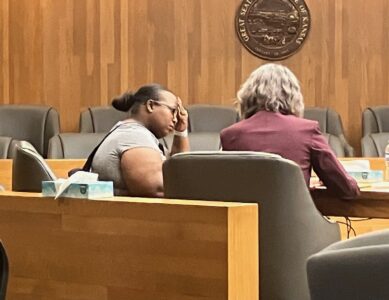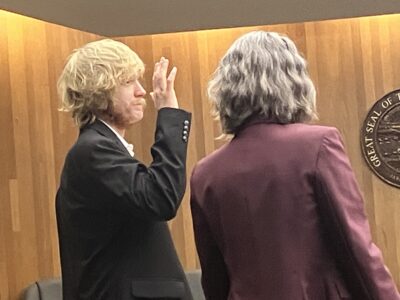Victim’s mother blames his ex at hearing for defendants in rural Lawrence murder, arson case

Defendant Tria Evans, 38, of Lawrence, second from right, stands with her attorney, Carol Cline, during an appearance before Judge Kay Huff on Tuesday, Feb. 6, 2018, in Douglas County District Court. Also pictured is Christina Towell, 37, of Leavenworth, far left, next to her attorney, Michael Clarke. The two are accused of killing Joel Wales, whose body was found in a burning home.
When asked the first thing that went through her mind when she was told her son was dead, Debbie Wales’ response was terse.
“Tria did it.”
Wales was the first witness to testify Friday at a preliminary hearing for two women charged with murder in the death of Joel Wales, 34, of Eudora.
“I knew at some point that this was going to happen,” Debbie Wales told the court. “Her actions were just getting more aggressive. I just thought she was going to end up doing this.”
Tria L. Evans, 38, of Lawrence, is the mother of Joel Wales’ child. She and Christina L. Towell, 38, of Leavenworth, are each charged with first-degree murder, conspiracy to commit murder, arson and aggravated burglary. Charges allege that they conspired to kill Wales — with Towell driving Evans to and from the scene — then cover up the crime by setting the house on fire.
The killing happened in Debbie Wales’ house south of Lawrence, 1104 E. 1200 Road, around 9:30 p.m. on Nov. 3, 2017, while she said she was traveling out of state and her son was housesitting.
Answering questions from prosecutor Amy McGowan, Debbie Wales said the relationship between Evans and her son started around 2013.
“At the beginning, it seemed everything was fine,” Wales said. “As time went by things started changing.”
Debbie Wales said Evans became “controlling,” “stalking,” and got “in a frenzy” when she didn’t know where Joel Wales was — calling, texting and sitting in her car parked down the road. After splitting up, the couple had a parenting agreement for their now 4-year-old daughter, and Debbie Wales said that when she accompanied her son for pre-arranged drop-off appointments, Evans frequently failed to show up.
Evans ended up on probation after a June 2016 domestic incident involving the Wales family, and Debbie Wales got a no-trespass order against Evans, which she renewed again in 2017, she said.
As for Towell, Wales said she didn’t know her and had never seen her before.
Towell herself spoke briefly — and abruptly — during Friday’s hearing.
After Debbie Wales stepped down from the witness stand, Towell stood up unannounced, fidgeting with a rolled-up paper in her hands, and said, “Your Honor, before we proceed any further, I would like to address the court.”
Judge Kay Huff asked Towell’s appointed attorney, Michael Clarke, “What is this about?”
Clarke said he did not know, and the judge ordered a recess so he could consult with his client.
Back in the courtroom, Towell did not speak again but confirmed she would communicate with her attorney.
“I think the emotional nature of the situation got a little bit much,” Clarke said.
Friday morning’s testimony continued with a firearms technician who tested shell casings and six fired bullets recovered from the scene and Joel Wales’ body.
The technician said three bullets from the body arrived at the Johnson County crime lab in evidence containers labeled “bullet in brain,” “upper bullet in left chest wall” and “lower bullet in left chest wall.”
He said the bullets from the chest each had signs they’d been shot through glass, such as a tempered glass door or window.
He also said testing of marks on the bullets showed they all came from the same gun, a Smith and Wesson Bodyguard .380 pistol. While he had no actual weapon to test them against, that is the same type of handgun that detectives found a box for in Evans’ home.
Morning testimony also included the first Douglas County Sheriff’s Office deputy on the scene. Other testimony came from a next-door neighbor who called 911 after hearing gunshots, seeing fire erupt on the house’s front porch and a woman getting into the passenger side of a car parked in the driveway, which then flipped its lights on and drove off.
Evans’ appointed attorney is Carol Cline.
Testimony was expected to continue through Friday afternoon.
At the conclusion of the preliminary hearing — which will be scheduled for a later day if testimony doesn’t wrap up Friday — the judge will rule whether there is probable cause to bind over the defendants for trial on their criminal charges.







